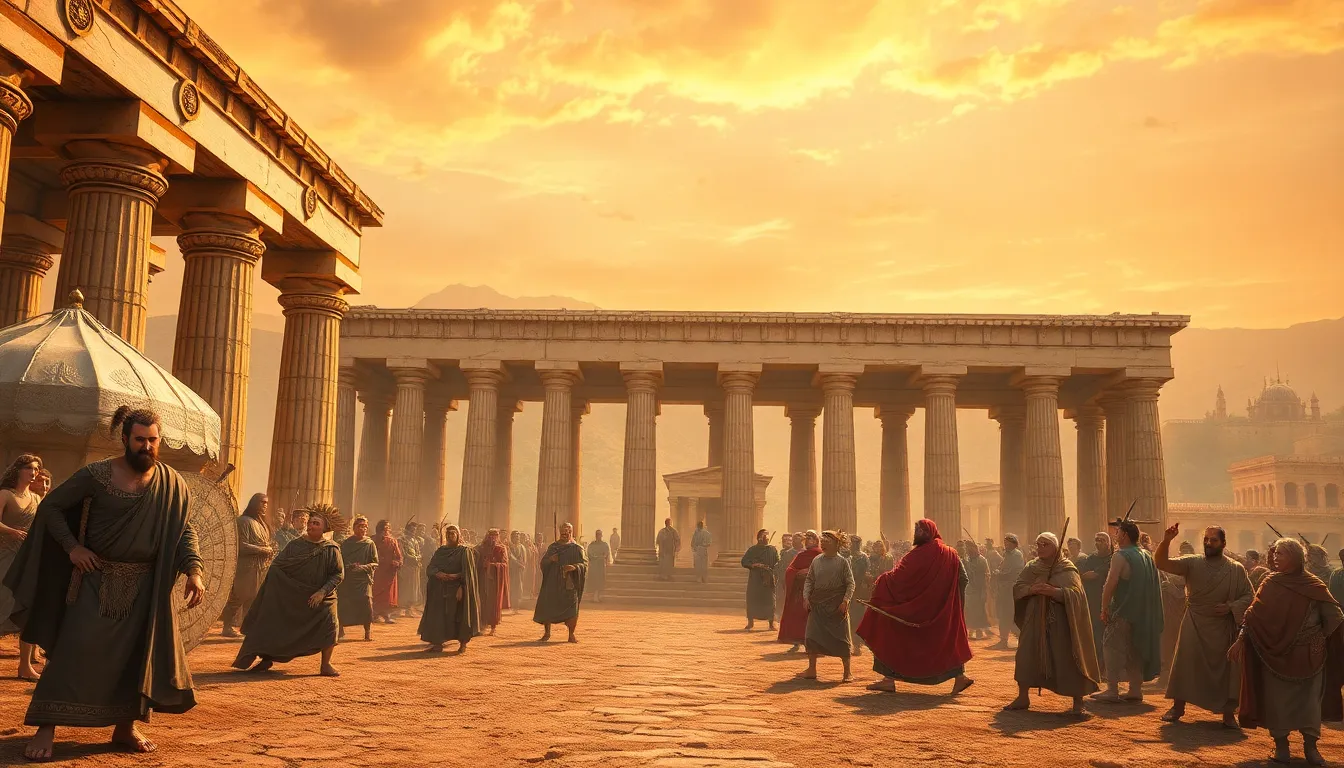Unraveling the Myths Behind the Ancient Greek Festivals
I. Introduction
Ancient Greek festivals were vibrant celebrations that played a significant role in the cultural and religious life of the Greeks. These festivals were not only occasions for entertainment but also served as crucial gatherings for community bonding, religious devotion, and the commemoration of historical events.
The importance of festivals in Greek culture cannot be overstated. They were deeply intertwined with Greek mythology, honoring gods and goddesses, celebrating agricultural cycles, and fostering civic pride. This article aims to debunk common myths surrounding these ancient festivals, shedding light on their true significance and practices.
II. The Origins of Ancient Greek Festivals
The origins of ancient Greek festivals can be traced back to various historical contexts, evolving over centuries as Greek society transformed. Early festivals were often linked to agricultural cycles, celebrating harvests and invoking divine blessings for fertility and abundance.
Two main categories of festivals emerged:
- Religious Festivals: These were held in honor of the gods and included rituals, sacrifices, and processions.
- Secular Festivals: These focused on civic pride, athletic competitions, and artistic performances, often emphasizing community identity.
Festivals reflected the social structure of Greek society, showcasing the values and priorities of the time, such as honor, glory, and the importance of community and family.
III. Major Festivals and Their Significance
Several major festivals stand out in ancient Greece, each with its own unique significance and customs:
A. The Olympic Games: More Than Just Sports
The Olympic Games, held every four years in Olympia, were dedicated to Zeus and celebrated athletic prowess. However, they were more than just a sporting event; they symbolized unity among the Greek city-states and featured cultural events, such as poetry recitals and musical performances.
B. Dionysia: Celebrating Wine, Theatre, and Fertility
The Dionysia, held in honor of Dionysus, the god of wine and fertility, was a major festival that celebrated not only wine but also the theatrical arts. The festival included dramatic competitions, where playwrights showcased their tragedies and comedies, contributing to the evolution of Western theatre.
C. Panathenaea: A Tribute to Athena
The Panathenaea was the most important festival in Athens, celebrating the city’s patron goddess, Athena. The festival featured a grand procession, athletic competitions, and sacrifices, culminating in the presentation of a new peplos (robe) to the statue of Athena in the Parthenon.
IV. Myths About Festival Practices
Despite their significance, many myths surround the practices associated with ancient Greek festivals.
A. Misconceptions About Rituals and Sacrifices
One common misconception is that rituals involved excessive violence or barbarism. In reality, while some sacrifices were indeed part of the ceremonies, they were conducted with great respect and were often symbolic, aimed at appeasing the gods rather than being cruel.
B. The Role of Women in Festivals
Another myth is that women had little to no role in these public celebrations. Contrary to this belief, women participated in various festivals, particularly in rites dedicated to female deities, such as Demeter and Artemis, where they played crucial roles in rituals and celebrations.
C. Common Myths About Participants and Spectators
It is also a myth that only elite members of society participated in festivals. In fact, festivals were community events that welcomed all citizens, regardless of their social standing, thereby fostering a sense of unity and shared identity.
V. The Impact of Mythology on Festivals
Greek mythology was fundamentally intertwined with the festivals celebrated in ancient Greece.
A. The Role of Gods and Goddesses in Festival Celebrations
Many festivals were directly linked to the worship of specific gods and goddesses, with rituals designed to honor their attributes and seek their favor. For instance, the Olympic Games were dedicated to Zeus, while the Dionysia celebrated Dionysus.
B. Stories and Legends Associated with Key Festivals
Each festival was often accompanied by stories and legends that explained its origins and significance. These myths served to reinforce the values of the society and the importance of the divine in everyday life.
C. How Myths Shaped Festival Traditions
Myths not only explained the reasons for festivals but also shaped the traditions and practices that developed around them, ensuring that the cultural narratives were passed down through generations.
VI. The Influence of Festivals on Modern Culture
The legacy of ancient Greek festivals continues to influence modern culture in various ways.
A. Lasting Legacy of Ancient Greek Festivals
Many of the values and practices established during these festivals can be seen in contemporary celebrations, sports events, and cultural festivals around the world.
B. Modern Festivals Inspired by Ancient Traditions
Festivals such as the Olympic Games have been revived in modern times, drawing inspiration from their ancient predecessors and emphasizing unity, competition, and cultural exchange.
C. The Continued Relevance of Greek Mythology
Greek mythology remains a cornerstone of Western literature and art, with its themes and characters still resonating in modern storytelling and cultural expressions.
VII. Scholarly Perspectives: What Historians Say
Historians and archaeologists have continually explored the evolution and significance of ancient Greek festivals.
A. The Evolution of Interpretations of Greek Festivals
Over time, interpretations of these festivals have evolved, with scholars re-examining their socio-political contexts and cultural significance.
B. Recent Archaeological Findings
Recent archaeological excavations have uncovered artifacts and structures related to these festivals, offering new insights into their practices and community impact.
C. Debates Among Historians and Mythologists
Debates continue among scholars regarding the interpretations of ancient texts and the significance of various rituals, reflecting the complexity and richness of Greek festival culture.
VIII. Conclusion
In summary, ancient Greek festivals were multifaceted events that reflected the cultural, religious, and social dynamics of their time. Understanding these festivals helps illuminate the values and beliefs of ancient Greek society.
As we explore the myths and realities surrounding these festivals, we gain a deeper appreciation for their importance in shaping both ancient and modern cultures. We encourage further exploration of Greek mythology and its enduring influence on our world today.




